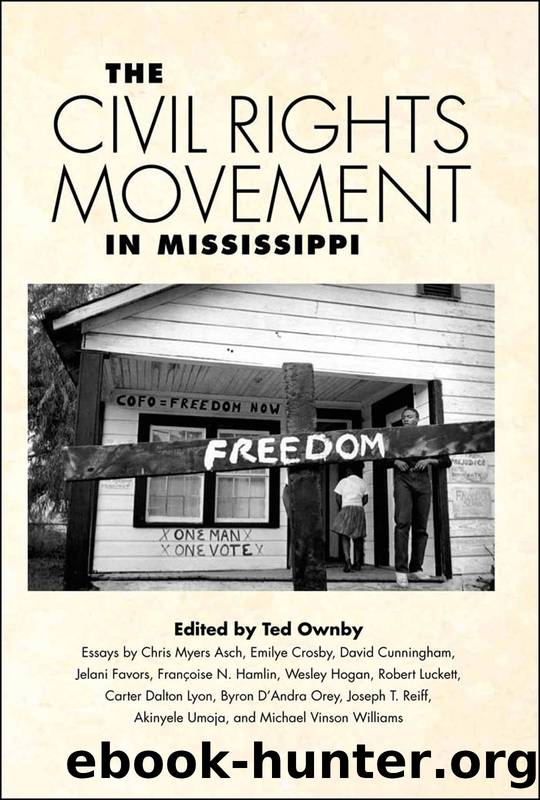The Civil Rights Movement in Mississippi by Ownby Ted;

Author:Ownby, Ted;
Language: eng
Format: epub
Publisher: University Press of Mississippi
Published: 2013-08-15T00:00:00+00:00
âBorn of Convictionâ
White Mississippians Argue Civil Rights in 1963
Joseph T. Reiff
Imagine you are a white Methodist preacher in Mississippi in the early 1960s. You grew up in the 1930s and 1940s in a segregated world and simply accepted it as reality. Then as a Methodist teenager or college student at Millsaps or Mississippi Southern, you were exposed to a few speakers, religious life leaders, or professors who gently but persistently pushed you to ask questions about that segregated world. As a college student involved in religious life, you had the opportunity in the late 1940s to meet with a few students from black colleges in Mississippi at occasional events sponsored by religious life leaders at the schools, or in the late 1950s you participated in an interracial forum at Tougaloo College, or you heard Tougaloo professor Ernst Borinski publicly calling segregation into question at Millsaps in 1958.1
Feeling a genuine call to the ordained Methodist ministry, you attended seminary (at Emory or Vanderbilt or Yale or Southern Methodist University [SMU] or Duke or Drew) and were challenged to think in new ways about race relations and the role of the church in society. Now back in southern Mississippi, you have begun your service as a local church pastor in the Mississippi Conference, more conscious of the evils of the âClosed Society,â but not sure what you can do to change things. In spite of the national Methodist Churchâs call for a new day in race relations, it still maintains a segregated structure: in addition to the stateâs two white annual conferences, Mississippi and North Mississippi, there are two black Mississippi conferences (part of the larger Central Jurisdiction), and there is little interaction between white and black Methodists, even those who live in the same town.2
This was the situation for the twenty-eight white Methodist ministers of the Mississippi Conference (hereafter referred to as âthe 28â) who signed âBorn of Conviction,â the second-best-known white clergy statement in the civil rights era. Written in the wake of the September 1962 riot at the University of Mississippi and appearing in the Mississippi Methodist Advocate (the weekly newspaper for the two white conferences) on January 2, 1963, the statement called for freedom of the pulpit, reminded readers of the Methodist Disciplineâs (the denominationâs official book of doctrine and polity) claim that the teachings of Jesus â[permit] no discrimination because of race, color, or creed,â expressed support for the public schools and opposition to any attempt to close them, and affirmed the signersâ opposition to Communism.3
âBorn of Convictionâ caused a firestorm of controversy, and I propose that its publication three months after the insurrection at Ole Miss, along with the range of public and private responses to it, can be understood as a full-fledged argument among whites in Mississippi about the civil rights movement and its increasingly persistent call for an end to the segregated system and white supremacist ideology. This early 1963 debate reveals the complexity of attitudes as white Mississippians were confronted with the possibility
Download
This site does not store any files on its server. We only index and link to content provided by other sites. Please contact the content providers to delete copyright contents if any and email us, we'll remove relevant links or contents immediately.
Cecilia; Or, Memoirs of an Heiress — Volume 1 by Fanny Burney(32064)
Cecilia; Or, Memoirs of an Heiress — Volume 3 by Fanny Burney(31459)
Cecilia; Or, Memoirs of an Heiress — Volume 2 by Fanny Burney(31409)
The Great Music City by Andrea Baker(30784)
We're Going to Need More Wine by Gabrielle Union(18636)
All the Missing Girls by Megan Miranda(14749)
Pimp by Iceberg Slim(13781)
Bombshells: Glamour Girls of a Lifetime by Sullivan Steve(13689)
Fifty Shades Freed by E L James(12918)
Talking to Strangers by Malcolm Gladwell(12881)
Norse Mythology by Gaiman Neil(12836)
For the Love of Europe by Rick Steves(11533)
Crazy Rich Asians by Kevin Kwan(8891)
Mindhunter: Inside the FBI's Elite Serial Crime Unit by John E. Douglas & Mark Olshaker(8707)
The Lost Art of Listening by Michael P. Nichols(7165)
Enlightenment Now: The Case for Reason, Science, Humanism, and Progress by Steven Pinker(6877)
The Four Agreements by Don Miguel Ruiz(6322)
Bad Blood by John Carreyrou(6281)
Weapons of Math Destruction by Cathy O'Neil(5837)
